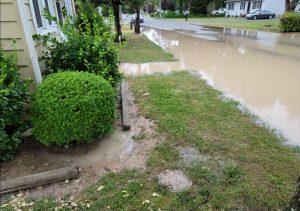
BERLIN – The Berlin Planning Commission delayed a decision regarding townhouses proposed for Maple Avenue after hearing traffic and drainage concerns from area residents.
The commission last week agreed to table a decision regarding a 33-unit townhouse project proposed for Maple Avenue. Commission members said they wanted the town to consider the need for a traffic study in the area before voting on the site plan presented by attorney Mark Cropper and developer Bobby Kitchens.
“While respecting the concerns of the various planning commission members, my client was disappointed at being unable to receive the desired favorable decision and proceeding with this project in the anticipated timely manner,” Cropper said. “At this time, he will continue to work with the Town of Berlin to try and find a solution acceptable to all parties that is not prohibitively too expensive.”
Cropper and Kitchens approached the commission last week seeking site plan approval for a 33-unit townhouse project on Maple Avenue. The development, to be called Mapledale, would take place on 4.5 acres of land currently zoned R-3 for multifamily homes. Comments from the commission, however, focused not on the project but rather existing issues in the neighborhood. Commission member Phyllis Purnell said the street had a longstanding stormwater management problem that was worse than ever now that The Willows, another townhouse project on the street, was under construction.
“That area’s flooded every time it rains,” she said. “Some of the houses now have water damage. All the water from Flower Street runs down Maple Avenue.”
She said the street didn’t need any more construction, as it had initially been built to serve just a dozen houses.
“It was never meant to have this massive construction that’s going on now,” she said.
Planning Director Dave Engelhart acknowledged that drainage was currently an issue on Maple Avenue but said part of the problem was the fact that stormwater drains had to be covered (per Maryland Department of the Environment standards) during construction at The Willows. He said the state didn’t want the stormwater drains open during construction because it would lead to more dirt being in the stormwater pipes.
Cropper said that if The Willows was creating a problem, that wasn’t the responsibility of his client.
“If The Willows project is creating that condition, then the developer of The Willows should cure that condition,” he said. “But it shouldn’t prevent the owner of this property from being able to develop this property as its zoned if this site plan complies with the code — which it does.”
He added that development projects were required to have stormwater plans to ensure the water from their sites didn’t impact neighboring properties.
Area resident Gregory Purnell echoed Phyllis Purnell’s concerns.
“There’s an issue with the road bed and the way the grade is on Maple Avenue,” he said.
In addition to the stormwater issues, Gregory Purnell questioned the amount of traffic the project would create. He said he’d grown up on Maple Avenue and that it used to be a quiet little street. He said the town needed to address the drainage problem before potentially adding in traffic problems.
“It’s not about one of the things it’s about all of the things,” he said.
Commission member Ron Cascio agreed that Maple Avenue could see hundreds more cars between The Willows and Mapledale.
“I think that’s something the town needs to address before we approve more stuff,” he said.
Chris Denny, chairman of the commission, said he thought a traffic study should be conducted.
“I agree,” Cascio said. “It’d be remiss not to have a traffic study. We should have caught this the previous project.”
Commission member Newt Chandler said he thought the town should be responsible for the traffic study, as it had zoned the property on Maple Avenue R-3.
“If the town rezoned the land for this kind of development they should be responsible for infrastructure,” he said.
Cropper said that the price of a traffic study, if required by the developer, might halt the project. He pointed out that Kitchens wanted to build affordable townhouses that could be sold to people currently renting.
“The price of a traffic study could put this under,” he said.
Cascio said that wasn’t the commission’s problem.
Commission member Pete Cosby said something needed to happen before more development could be approved.
“I know I can’t sit here in good conscience and ignore what I’m hearing,” he said.
Engelhart said the commission couldn’t encumber the town with the cost of a traffic study but could bring the situation to the attention of the town council. He added that the commission had required traffic studies from certain developers in the past, such as with Oceans East and Dollar General. He said he would discuss the situation with the town’s engineer.
“We can look into it,” he said.
The commission agreed to table any decision while the issue was researched.

